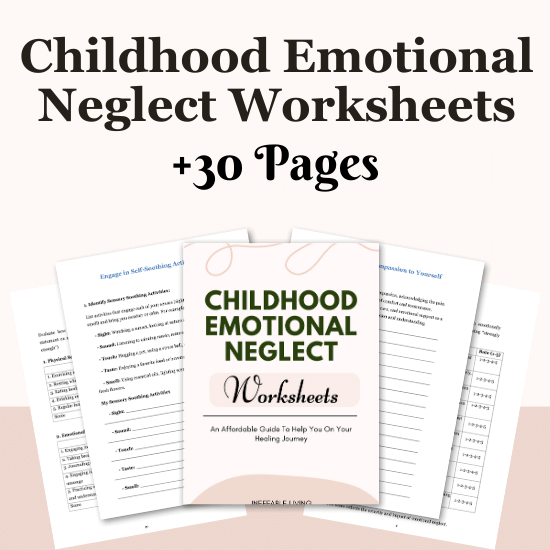Being a parentified child can significantly impact one’s emotional and psychological development.
This term refers to children who are thrust into adult roles, meeting their parents’ emotional or practical needs rather than receiving proper parental care.
This blog post will explore the causes and effects of being a parentified child and provide actionable steps for healing and reclaiming your sense of self.
Understanding Parental Boundaries
Parents are meant to nurture, guide, and support their children’s development.
When this dynamic is disrupted, and children are forced to meet their parents’ needs, it is known as boundary dissolution.
This breakdown in boundaries can lead to a child taking on adult-like roles prematurely, which impacts their ability to develop a stable self-identity.
Six Types of Boundary Dissolution
1. Role Reversal Parentification: The child takes on the nurturing role, providing emotional support to the parent.
2. Role Reversal Adultification: The parent treats the child as a peer, relying on them for companionship and support.
3. Seductive Spousification: The parent treats the child like an intimate partner, forming an emotional but non-physical connection.
4. Hostile Spousification: The parent treats the child like a spouse in a critical and demeaning way.
5. Psychological Control: The parent becomes domineering and controlling, dictating the child’s thoughts and actions.
6. Enmeshment: The parent and child have no distinct boundaries, sharing emotions and thoughts as if they are one person.
Why Does This Happen?
Various factors can lead to boundary dissolution:
– Inherited Behaviors: Parents who experienced similar dynamics in their childhood may unconsciously repeat these patterns.
– Parental Illness or Depression: Parents who are physically or mentally unwell may rely on their children for support.
– Single-Parent Households: In single-parent families, especially with multiple siblings, an older child might take on a co-parenting role.
These situations, while sometimes unavoidable, can deprive children of the essential nurturing and guidance needed for healthy development.
Related: Codependency And Enmeshment: 9 Signs You May Be In An Enmeshed Relationship
Consequences of Role Reversal
While some children develop valuable social skills and a sense of responsibility, the negative effects often outweigh these positives. Consequences include:
– Depressive Symptoms: Increased likelihood of experiencing depression.
– Relationship Problems: Difficulty relating to peers and forming healthy romantic relationships.
– Shame and Guilt: Internalizing negative beliefs about oneself, leading to low self-esteem and self-worth.
– Impaired Identity Development: Struggles with boundaries, self-esteem, emotional regulation, empathy, and intimacy.
How to Heal If You Were a “Parentified Child”?
1. Seek Professional Help
A therapist can help you understand how your upbringing affected you and work through unresolved issues. Therapy can address five key areas:
– Boundaries: Establishing and maintaining healthy boundaries.
– Self-Esteem: Building a positive self-image.
– Emotional Regulation: Learning to manage emotions effectively.
– Empathy: Developing a balanced sense of empathy.
– Intimacy: Forming healthy, intimate relationships.
Related: Top 10 Enmeshment Trauma Examples
2. Inner Child Work
Inner child work involves reconnecting with the part of yourself that experienced these childhood dynamics.
It helps you understand your emotional responses and fill in developmental gaps. This process includes:
– Accepting Your Inner Child: Recognizing that your inner child is a part of you that needs nurturing and acceptance.
Exercise:
- Sit or lie down in a comfortable, quiet place where you won’t be disturbed.
- Take deep breaths to relax your body and mind.
- Close your eyes and imagine a younger version of yourself. Picture this child in as much detail as possible—how they look, what they’re wearing, and how they’re feeling.
- Observe the emotions and expressions of your inner child. Are they sad, scared, or lonely? Acknowledge these feelings without judgment.
- Gently speak to your inner child. Use affirming and comforting words such as, “I see you,” “You are safe now,” and “You are loved.” Repeat these affirmations several times.
- Imagine yourself hugging your inner child, providing warmth, comfort, and reassurance. Feel the connection between your present self and your inner child.
- After the visualization, write down your experience. Note how you felt and any thoughts or insights that came up.
– Grieving the Loss: Acknowledging and mourning the lack of proper parental care.
Exercise:
- Find a quiet time and place where you can reflect without interruptions.
- Think about the experiences and emotions you went through as a child. Acknowledge the unmet needs and the role you had to take on.
- Write a letter to your past self or to your parents. In the letter, express your feelings of sadness, anger, and loss. Allow yourself to grieve for the childhood you missed out on.
- To Your Younger Self: “Dear [Your Name], I am so sorry for the responsibilities you had to take on and the childhood you lost. You deserved care, love, and freedom to be a child.”
- To Your Parents: “Dear Mom/Dad, I feel hurt and saddened by the role I had to play in our family. I needed you to be there for me, and it’s painful to realize that wasn’t the case.”
- Allow yourself to feel and express any emotions that arise while writing. Cry if you need to; it’s a natural part of the grieving process.
- Conclude the letter with a message of forgiveness (if you’re ready) and compassion towards yourself. Acknowledge your strength and resilience.
– Self-Parenting: Learning to take care of yourself, set boundaries, and prioritize your needs.
Exercise:
- Make a list of your physical, emotional, and psychological needs. Consider areas like rest, nutrition, emotional support, and personal time.
- Develop a weekly self-care plan that includes activities and practices to meet these needs. Schedule time for relaxation, hobbies, exercise, and social connections.
- Identify areas in your life where boundaries are needed. Practice saying “no” when you feel overwhelmed or when something doesn’t serve your well-being. Write down a few boundary statements you can use, such as, “I need some time for myself right now,” or “I can’t take this on at the moment.”
- Each morning, look in the mirror and speak positive affirmations to yourself. Say things like, “I deserve to take care of myself,” “My needs are important,” and “I am worthy of love and respect.” Feel the truth of these statements as you say them.
- At the end of each week, reflect on your self-care plan. Note what worked well and what didn’t. Adjust your plan as needed to better meet your needs.
Related: Mother-Son Enmeshment Signs & How To Overcome It
3. Practice Self-Compassion
Self-compassion involves treating yourself with kindness and understanding.
It’s about recognizing your struggles without judgment and giving yourself the care and respect you deserve. This includes:
– Prioritizing Self-Care: Making healthy decisions about diet, sleep, exercise, and regular medical checkups.
– Maintaining Boundaries: Asserting your needs and saying no when necessary.
– Balancing Sacrifices: Understanding that while making sacrifices is part of life, it’s crucial to maintain a balance and not always prioritize others over yourself.
4. Forgiveness and Acceptance
Forgiving your parents, if possible, or accepting their flaws can help release anger and resentment.
This step is essential for focusing on your self-improvement and moving forward.
Related: Top 10 Signs of Enmeshed Friendship

Conclusion
Overcoming the effects of being a parentified child is a challenging but achievable process.
By recognizing the signs, seeking professional help, practicing self-compassion, and building a supportive network, you can reclaim your sense of self and lead a healthier, more fulfilling life.



